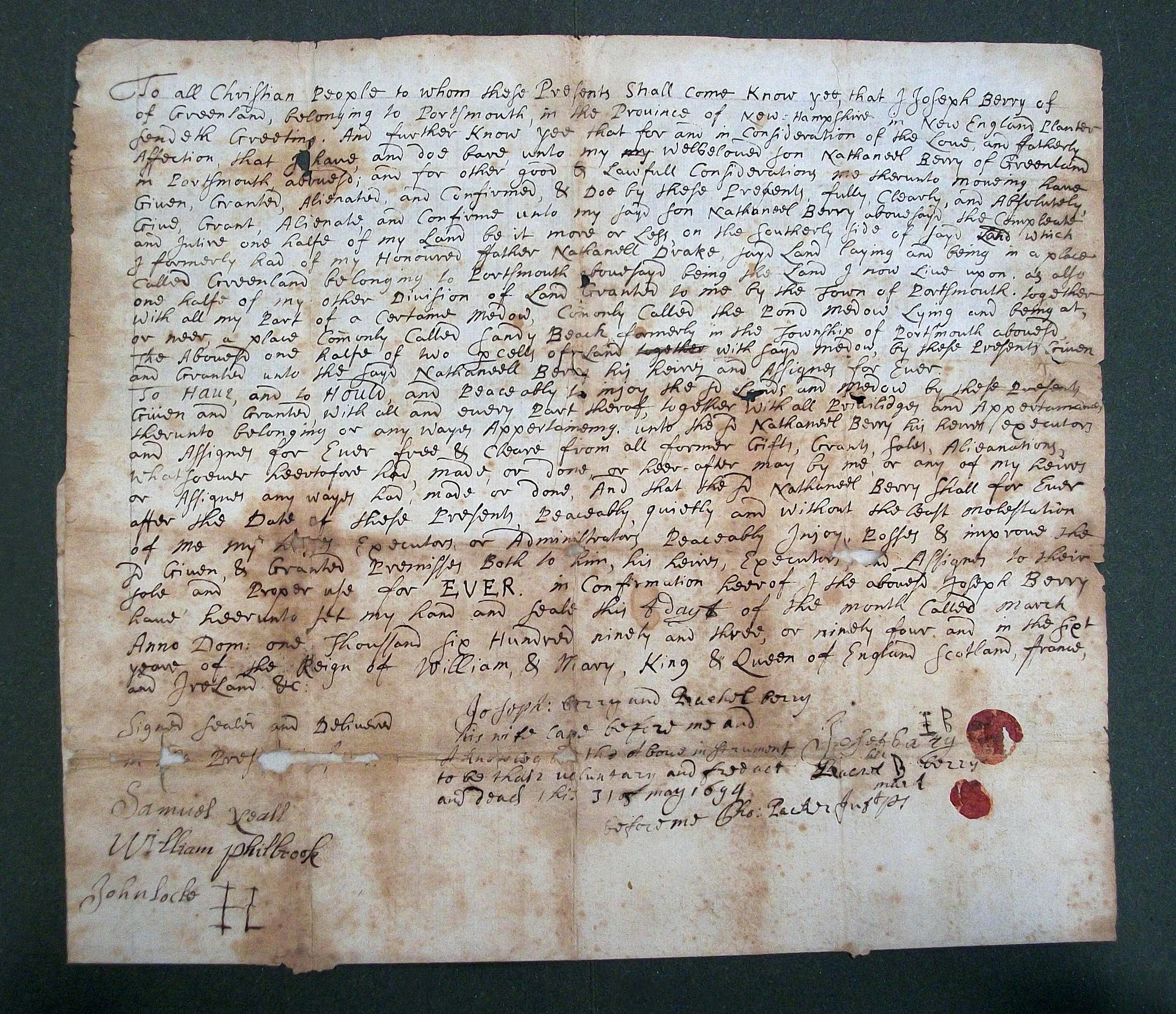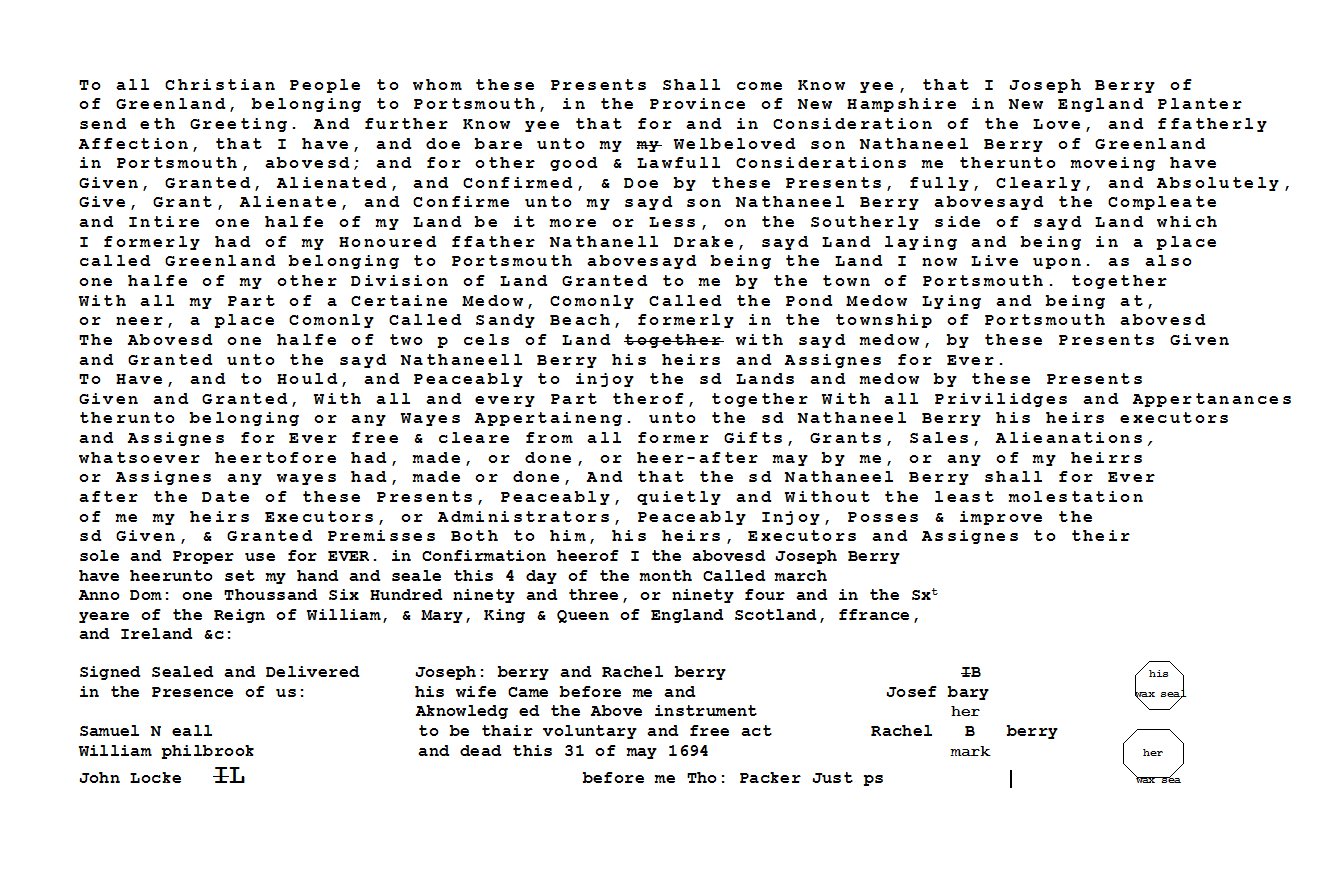HANDWRITING AND ORIGINAL SIGNATURE
Our First Packer Ancestor to come to the New World
Terry Packer is our guest blogger for a series of five posts telling the story about the research and acquisition of an early land transfer document signed by his ancestor.
Part 1 - ACQUISITION
Five years ago I had the good fortune to acquire a colonial document dated May 31, 1694. Although it is by and about Rye's founding Berry family, it bears the original handwriting and signature of my first Packer ancestor in America, Dr/Col Thomas Packer of Portsmouth and Greenland. He certified the document in his capacity as Justice of the Peace.
The good fortune of finding and acquiring this document began with marrying my wife, who is a descendant of Rufus Putnam, a Brigadier General during the Revolutionary War. Like many revolutionary leaders, he suffered financially to support the Revolution.
Following the war, the United States needed money to pay debts and Rufus needed a new career. So in Boston, he formed a group called the Ohio Company of Associates. Its purpose was to settle the Northwest Territory, roughly the lands between the Appalachian Mountains and the Mississippi River, which had been ceded to the U.S. by Great Britain under the Treaty of Paris. The Ohio Company bought about 1,000,000 acres of land north of the Ohio River from the U.S. government. They hoped to promote and organize its settlement and to sell their land for a profit along the way. In April 1788, Putnam traveled to what would become Marietta, Ohio, built a cabin in the woods, and established the first European-American permanent settlement in the Northwest Territory. His cabin survives and today's Campus Martius Museum was built to enclose it.
In 2015, my wife and I traveled to Marietta to exchange Putnam family information with the museum's curator. I noticed a display case with a small number of colonial-era documents and asked where they had come from. He said some were the property of the museum but several were his own which he loaned for display. When I asked how he had acquired them, his reply was a single surprising word. eBay.
“So to be successful, a search will likely require significant, persistent effort in addition to being very lucky. For most colonists, no documentary records have survived.”
It turns out historic documents and handwritten manuscripts are auctioned there. But although they are concentrated in distinguishing categories, these categories are not presented as options for eBay buyers under "All Categories". They can only be directly accessed by sellers for categorizing their offerings. So to begin, it is easiest to search for and bring up ANY item similar to your target after which you can focus your search. For example, you might search "colonial manuscript Massachusetts" for which you would be likely to get some hits. Several suggested categories will appear on the left of the page, often with names like "collectible, paper ephemera, pre-1800's". However, if you select a particular item from the page you've opened, the category in which it is listed will be displayed and might be "Antiques, Manuscripts". This illustrates that historic items of interest might be found in any of many different categories, including separate categories for specific eras, i.e. pre 1700s, pre-1800s, etc. This complicates efficient searching because if you don't specify a particular search term or category, your results may be too numerous and overly broad. But if you do, you may miss items of interest listed in other similar categories.
So to be successful, a search will likely require significant, persistent effort in addition to being very lucky. For most colonists, no documentary records have survived. But while documents relating to notable people and events are more likely to have survived, many have gone out of reach into the collections of archives, museums, and libraries. And of the remaining documents which change hands at auction, sellers' descriptions typically name primary signers but often overlook other named persons. Our document, for example, names Nathaniel Drake as Joseph Berry's father, but Nathaniel Drake was not mentioned in the document summary. Finally, you must chance upon your document during its auction period. Otherwise, you may discover it only after its auction has ended or it may come to auction and be removed without you ever knowing. So to be thorough requires repeatedly searching for documents in your approximate time-frame and/or location of interest, potentially in several categories, and then reading all the potential documents, in their entirety.
Despite my ancestor, Dr. Thomas Packer having been prominent in New Hampshire for forty years as Justice of the Peace, landlord to the colonial House and Judiciary, surgeon, Lt. Colonel in the militia, Speaker of the House, Judge of Probate and Counselor to the Governor, my search for a document in private hands continued for more than a year before blind luck and persistence paid off. But whether you find your prize or not, the search is a rewarding opportunity to read colonial history written by the hands of the people who lived it.
Transcription of document





